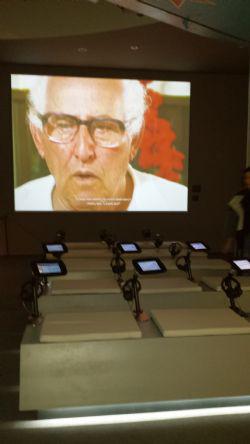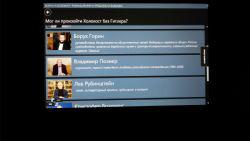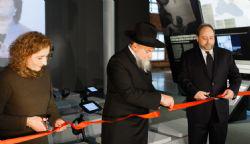
The Learning Center viewing stations - Courtesy of Yad Vashem

The Learning Center viewing stations - Courtesy of Yad Vashem

Opening ribbon cutting ceremony - Courtesy of Yad Vashem
01 February 2016
(Jerusalem, February 1, 2016) Yad Vashem opened a new interactive learning center entitled "The War and the Holocaust: Thoughts on the Past and Future" in the Jewish Museum and Tolerance Center in Moscow. The exhibition located in the Museum's "The Holocaust and the Great Patriotic War" Pavilion opened to the public on January 27th, International Day of Commemoration in Memory of Victims. The center includes an interactive display where visitors are presented with answers to many complicated questions relating to the major tragedy of the 20th century, such as: How did people become mass murderers? Why did the Nazis want to kill the Jews specifically? What happened to the concepts of good and evil after the Holocaust? and What helped people maintain their human dignity in conditions of occupation and persecution?
Renowned writers, historians, and religious and publics figures - including L. Ulitskaya, N. Svanidze, L. Rubinshtein, V. Pozner, V. Erofeev, O. Budnitsky, B. Gorin, Metropolitan Bishop Yuvenaliy, David Grossman, Rabbi Israel Meir Lau – were interviewed, providing a collection of 100 answers to these complex questions. In addition, nine further questions relevant to Russia today are posed, such as "How can we explain the policy of Holocaust omission during the Soviet period?" and "Does antisemitism exist in modern-day Russia?"
The new Center in Moscow, the result of close cooperation between the Jewish Museum and Yad Vashem's International School for Holocaust Studies together with the support of the Genesis Philanthropy Group, is based on the Learning Center located at Yad Vashem in Jerusalem. In recent years Yad Vashem has opened similar centers in Sydney, Australia and at its permanent exhibition "Shoah" in Block 27 in Auschwitz, Poland, confirming the powerful pedagogical contribution of this model.
"The opening of a center of this nature in Moscow, the capital of the Russian Federation and the Former Soviet Union, on whose land the Nazis committed mass murders of Jews during the Holocaust, is of great importance," noted Yad Vashem Chairman Avner Shalev. "This new educational tool will enable young people and their educators to discuss the meanings and consequences of the Holocaust, and thereby make its commemoration more relevant for their own lives in today's challenging society."
"From its inception, Genesis Philanthropy Group has placed emphasis on research in the field of Holocaust history on the territory of the Former Soviet Union and on the extensive dissemination of that knowledge. The desire to ask questions, to learn and to speak about the most tragic pages of the past is a very important human quality, which keeps the history of every people alive," said Ilia Salita, CEO of Genesis Philanthropy Group. "I am sure that the questions and the answers of the notable thinkers and public figures recorded for the interactive center in the Jewish museum and Tolerance center in Moscow, which was created in partnership with Yad Vashem, will contribute greatly to the preservation of the memory of Holocaust. This knowledge and this memory are of great importance in strengthening Jewish identity of young Russian-speaking Jews in the Former Soviet Union and around the world".






